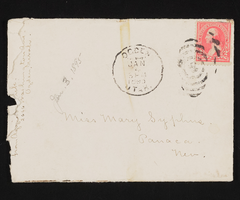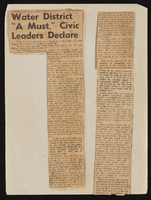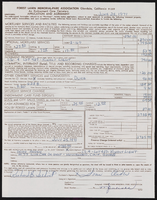Search the Special Collections and Archives Portal
Search Results
White Cross Drug Store Scrapbook
Identifier
Abstract
The White Cross Drug Store Scrapbook (1950-1964) contains photographs, employee training materials, newspaper clippings, advertisements, displays, and some historical narrative and press release material on the history and mission of the White Cross Drug Store. It also includes advertising ephemera and brochures on cosmetic products and perfumes of the early 1950s.
Archival Collection
Elizabeth Casper Photograph Collection
Identifier
Abstract
The Elizabeth Casper Photograph Collection, approximately 1947 to 1960, contains photographic prints and slides that document the childhood of artist and schoolteacher, Elizabeth Casper, and her family life in Las Vegas, Nevada. Included are images of Casper and her family as well as the Helldorado parade, civic celebrations, churches, a nursery school, and casinos in Las Vegas.
Archival Collection
Monty Brandt Photograph Collection
Identifier
Abstract
The Monty Brandt Photograph Collection consists of black-and-white photographic prints of the White Cross Drug Store on Fremont Street in Las Vegas, Nevada from 1924 and 1955. Images include views of Fremont Street, as well as interior and exterior views of the White Cross Drug Store.
Archival Collection
Circus Circus Enterprises Scrapbook
Identifier
Abstract
The Circus Circus Enterprises Scrapbook consists of articles from 1984 related to the Circus Circus Las Vegas Hotel and their investment properties. The scrapbook includes articles on the entertainment, dining, real estate, and management of Circus Circus Enterprises in Southern Nevada.
Archival Collection

Letter and envelope from Aggie Herrick Ogden, Utah. to Mary Etta Syphus, Panaca, Nevada
Date
Archival Collection
Description
From the Syphus-Bunker Papers (MS-00169). The folder contains an original handwritten letter, an envelope, a typed transcription of the same letter, and a copy of original letter attached.
Text
Audio clip from interview with Charles Salton by George Green, April 23, 1976
Date
Archival Collection
Description
Part of an interivew with Charles Salton on April 23, 1976. In this clip, Salton discusses his partnership with Larry Larkin and building in Las Vegas.
Sound

Transcript of interview with Christie Young by Dennis McBride, October 18, 1998
Date
Archival Collection
Description
I've known Christie Young for many years and was grateful she agreed to be interviewed for the Las Vegas Gay Archives Oral History Project. Not only is she frank in what she says, but her background as a researcher in sexual issues and as a straight woman involved in the gay community give her a unique perspective. Ancillary to her donation of this interview transcript to the University of Nevada, Las Vegas, Christie has generously donated her personal journals which detail more than a decade of her life including the years she worked with Las Vegas's gay community . Christie shares the project's concern that documentation of the gay community is ephemeral and vanishes rapidly; her determination that her contribution to that community be preserved greatly enriches our knowledge and will benefit future scholars.
Text



